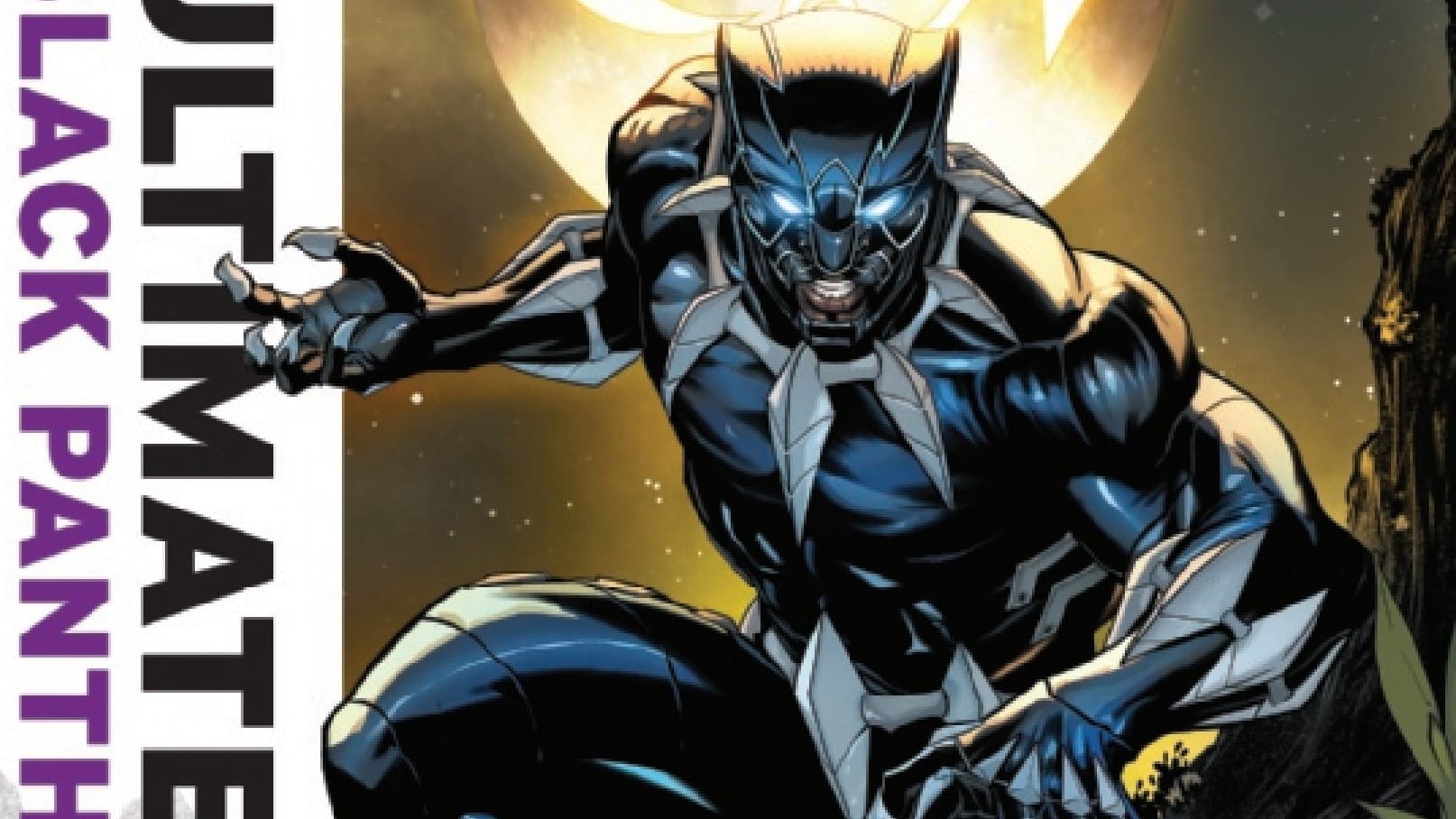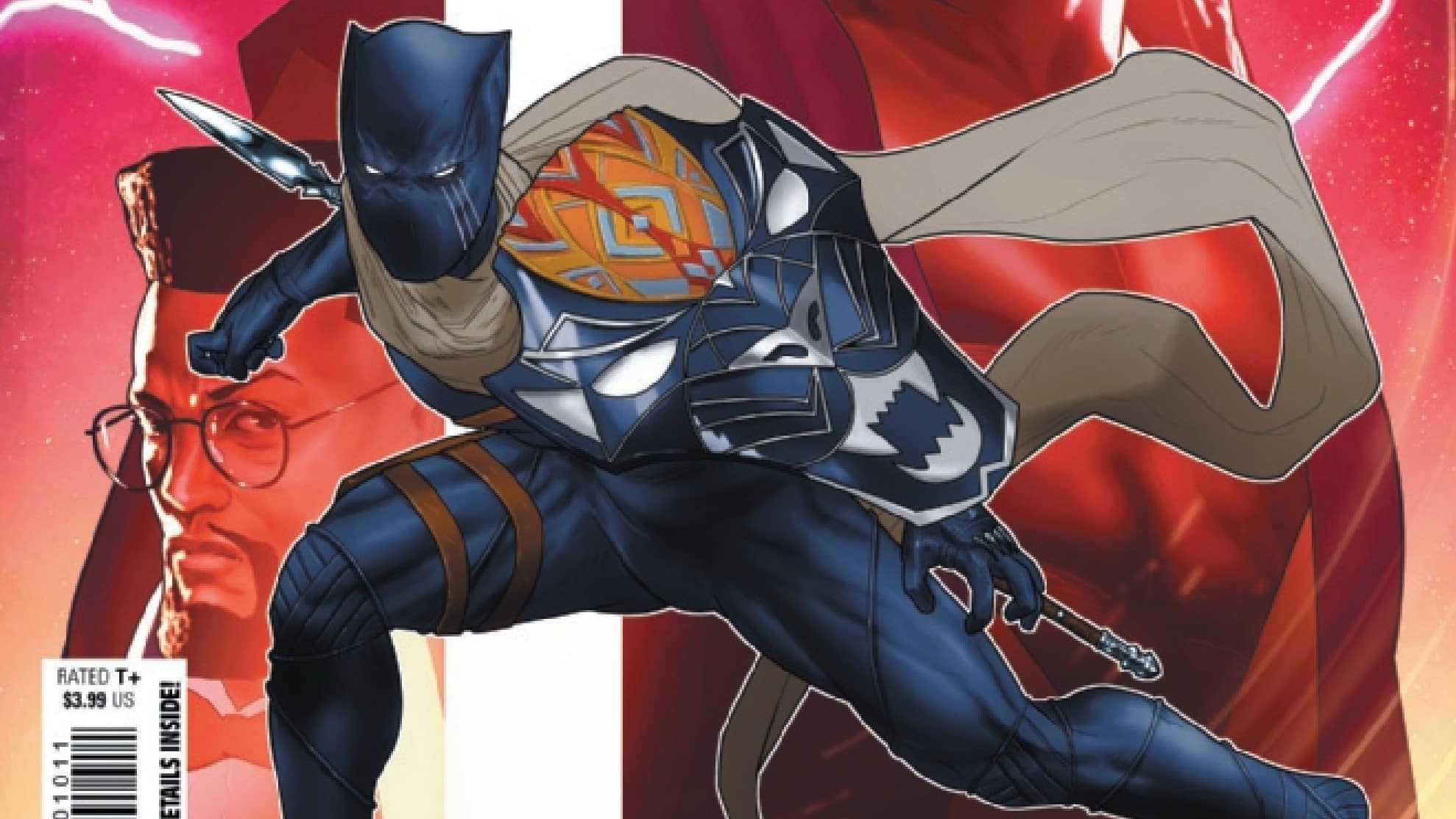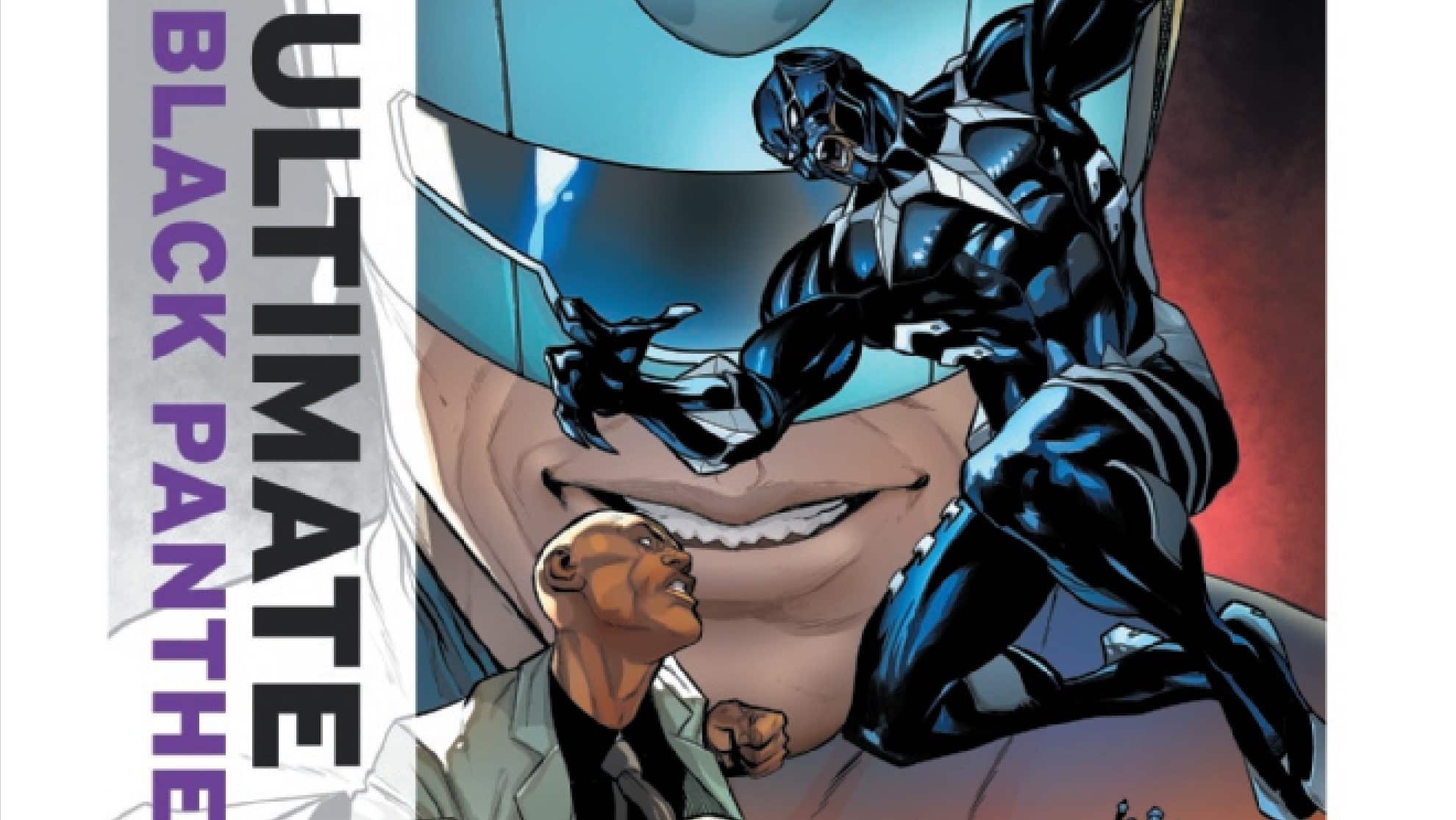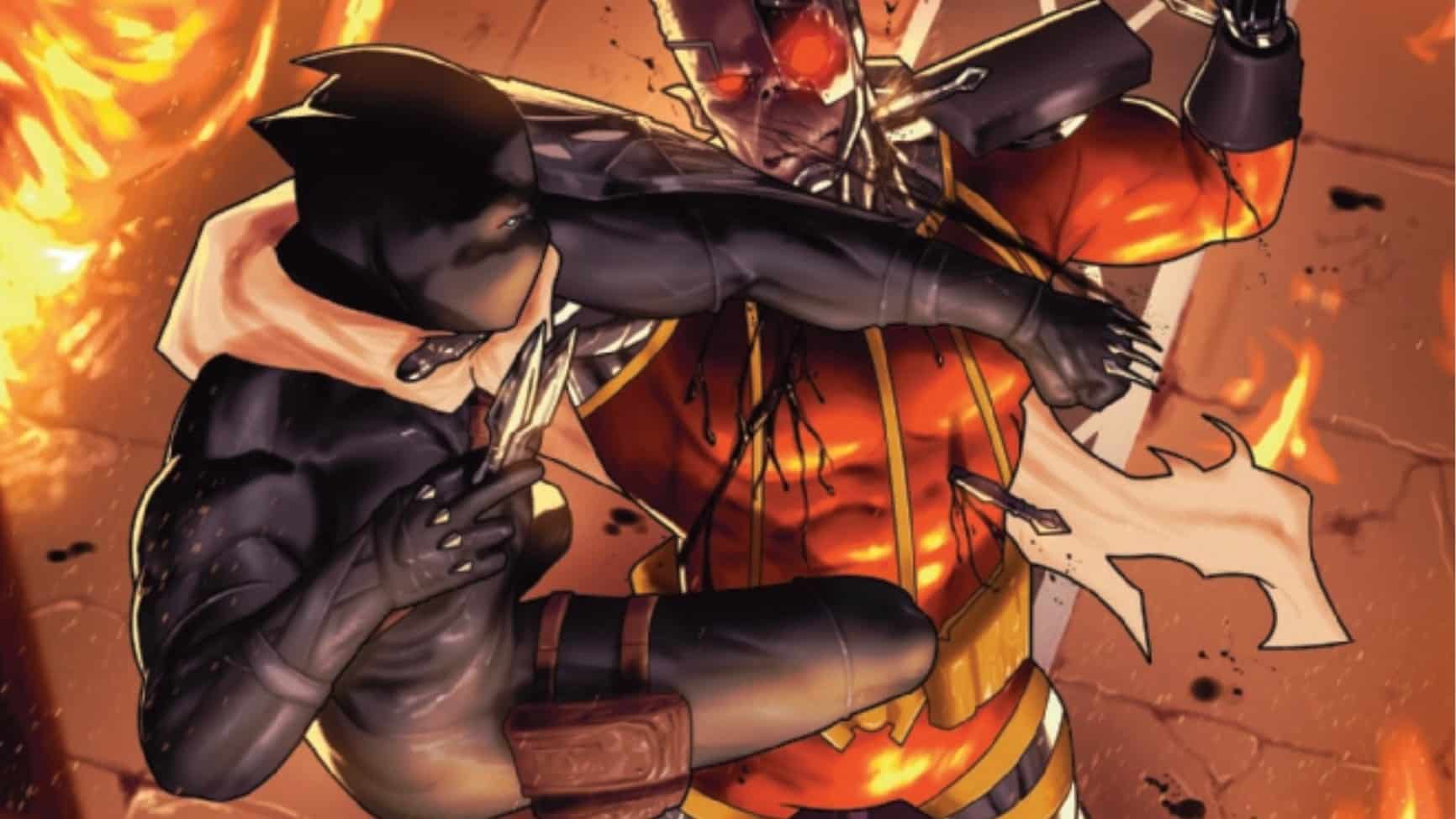Khonshu and Ra, the force known together as Moon Knight, are seeking to expand their brutal control of the continent of Africa. In response, the lone bulwark against them, the isolated nation of Wakanda, will send forth its champion, its king, the Black Panther. Find out what happens next in Ultimate Black Panther #1, written by Bryan Edward Hill, drawn by Stefano Caselli, colored by David Curiel and lettered by Cory Petit.
During the second half of John RIdley’s Black Panther run, there’s a panel where a defeated T’Challa, bloodied and beaten, receives a knock-down punch from Captain America.
T’Challa, the adopted champion of the diaspora, my diaspora, humbled by a white man draped in the flag — that flag.
I was angered. Ashamed. Seeing this symbol of the diaspora beaten by a symbol of “freedom” was a bridge too far — something the white men who created the Black Panther might have innocently concocted, but something I’d expect to be handled more profoundly in the 21st century. Sure, I continued reading the comic, though it now felt like an obligation — a habit, not an honor. And while Eve Ewing’s done a yeoman’s job of subsequently reclaiming T’Challa’s character, I still struggle to reconnect to the comic I once loved.
Enter Ultimate Black Panther.
Penned by Brian Edward Hill, whose Killmonger mini is required reading, Ultimate Black Panther promises an alternate take on a character that most assuredly needs reinvigorating. The Maker, an alternate version of Reed Richards, has created a new universe, intentionally culled of familiar heroes. There are no Avengers, (apparently) no X-Men (yet!); no Defenders, no Fantastic Four.
But there is still Wakanda.
And there is still a Panther.
Definitely maybe

As an Introductory issue, Ultimate Black Panther #1 has to establish personalities and conflicts; as it’s in an alternate-ish universe, seeing how norms are subverted is half the fun — ergo why so many people loved seeing a married Peter Parker, working a steady job for his Uncle Ben in Ultimate Spider Man.
But as fun as spotting differences for fans of the comics can be, the true question remains: “Does this tell an engaging, vital story?”
And the answer is … kinda. Maybe. Eventually?
If nothing else, Ultimate Black Panther #1 does an admirable job of establishing the norms of this world. Wakanda is still a kingdom, hidden from the world; it still has a king; the advanced technology that’s defined the kingdom appears to still be there, as does its royal family and royal protectors (the Dora Milaje).
Does vibranium exist? Is the king empowered by the heart-shaped herb? Is there more than one city? How much do they know about the outside world, specifically the workings of the Maker? All mysteries to (maybe!) be revealed in subsequent issues.
But we know this king has a queen — Okoye, the former head of the Dora. This king and queen sleep in separate beds. This queen gives love to her king from an arm’s length. Maybe there is love here; there is certainly obligation. But passion? There is none. (Also, for what it’s worth, her regalia looks reminiscent of a currently indisposed iron-clad hero … or maybe his young pseudo apprentice).
The king has a sister still, technologically curious and proficient as ever. Here, however, her technology makes weapons of war, and she, along with the rest of the Dora, seem all too impatient to use that weaponry for protection and liberation.
The king has a spiritual adviser, a female priestess named Matron Imala of the Vodu-Khan. Previous iterations of T’Challa relied heavily on a connection to the spiritual realm; this T’Challa remains a skeptic, patronizing the adviser who’s drawn as if she’s hiding a secret she can hardly wait to reveal. (Also notable: There is no mention of the King’s mother, who’s traditionally played a role as a personal and spiritual adviser.)
The king has a father, alive, and a source of pride and wisdom. His death in the main universe threw an ill-prepared T’challa into the throes of regality. Here, taking a page from the movies, it seems T’Challa has already ascended to kingship, using his father as a source of wisdom.
Until his father is no more, killed (apparently, maybe all too conveniently and too obviously) by the followers of Ra and Khonshu, aka the Egyptian gods of the sun and moon. These gods (or figureheads for the divine) have been terrorizing the entire African continent, laying waste to villages indiscriminately in the name of colonial expansion, stopped only by two ragtag revolutionaries: T’Challa’s infamous rival Killmonger and someone called the Wind Rider, her visage covered in lightning. These two jointly murder the soldiers who were about to lay waste to another village. Terrorists? Freedom Fighters? Mutants? Certainly time will tell, though it’s notable that this Killmonger’s righteousness seems more inline with the (maybe rightfully, maybe missguided) sympathetic interpretation of his revolutionary rhetoric taken from the movie.
So yes, we know a great deal about how this new world differs from the old. We see the central conflicts clearly: kingdom against colonizers, reason against religion, passion against purpose.
What we don’t see, even with all this new (and quite interesting) info, is personality: Everyone, save Killmonger, is stoic to a fault. We learn nothing about their motivations, desires or successes.
Maybe that’s too much to ask for a first issue. Maybe setting up the new normal is necessary before diving into personality traits and rationales for action.
Still, there is little joy or sadness to this story — simply cold, calculated movement forward.
And really, cold calculation is the book’s glaring flaw: It’s clean, easily digestible and interesting, sure. Make no mistake, this is an effectively written comic, and I’m interested to see where things go.
But…
Given the opportunity to begin a new universe, the “new” takes on these characters seem blandly traditional. For instance, it’s interesting seeing T’Challa married … only he doesn’t seem to be in love, and his traditional lover is in the picture. In practice, then, he’s not far off from where we’d find him in the main universe.
Thus the differences seem marginal at best — and while marginal changes can still be significant (and while other significant changes may yet be around the corner), it’s disappointing that, when given a blank slate, Hill chose to adhere so closely to the source material.
Including material that I’d hoped we’d long since matured past.
The idea that Moon Knight(s) colonized the entire continent, and that a continent — that continent — could be easily colonized; the usage of “West Africa” to denote an area, as opposed to a city or a nation that would absolutely be used when describing someplace in North America or Europe; the use of Vodu, which is West African in nature, bestowed upon Wakandans who reside in Central/Eastern Africa … all this reeks of American ignorance, retreading stereotypes that need to be dismantled. Sure, in the Ultimate universe, superpowered factions have effectively colonized the entire world, so maybe continental colonization shouldn’t be offensive. And yes, this is issue #1. Still, seeing Africa anonymized as a singular country with interchangeable parts feels regressive, and one hopes that future iterations of the comic will do better to recognize the diversity of the diaspora.
Diversity that should expand to the skin tones of its inhabitants. While the art is good bordering on great, the skin coloring leaves much to be desired. Sure, T’Challa is colored a handsome brown (if I do say so myself) … but so is everyone else. Everyone is literally the same skin tone — a mid-brown that, again, for Africans in East-Central Africa, seems a bit light. Does this take away from the enjoyment of the comic? Not really, not for most, I suspect. Still, if there is an opportunity to do better, one would hope the comic would take it.
I just think it’s neat

Ultimate Black Panther, then, does not feel immediately paradigm changing. This is different, yes, but not significantly — at least not on its face. The beats feel familiar and well trodden.
This, I suspect, won’t be a bad thing for most readers. The pacing and action are direct; the conversation less cerebral than Ewing’s or Ta-Nehisi Coates’, the main character not immediately unlikable like Ridley’s. For readers unfamiliar with comics but vaguely familiar with the movie (which, I’ll assume, is most people), nothing about this interpretation — at least nothing revealed yet — significantly contradicts what they’d expect. One might argue this is more “movie” T’Challa than comic T’Challa. The decisiveness of the final pages — “we go to war” — is markedly different from what we’ve seen in the past 7-8 years in the comic. We have a character who’s ready to act, impetuously, for righteous reasons. One who has an army at his disposal, with all the will in the world to use it.
This very well may be the comic many Black Panther fans were hoping for.
It doesn’t, however, feel revolutionary. Not all-new or all-different.
And certainly not subversive. Not yet anyway.
I didn’t walk away saying “wow.” I walked away saying “neat.”
Neat isn’t bad!
I don’t know if neat is enough.
I’m not sure there’s anything here to rope in anyone who hasn’t already been aware of the character, which is the central problem with alternate universe comics: they’re only as effective as one’s understanding of the source material. To get full impact, you need to be familiar with the OG version, which makes this all feel more like supplementary material than vital independent reading.
Still, I leave the experience genuinely intrigued as to how this version of Wakanda — unknown to the world — will expose herself.
If nothing else, I can say I’m curious and engaged, and that is something I haven’t been able to say for a few years now.
Clearly there’s more to unravel: Was there a traitor in the midst? Is the high priestess someone closer to T’Challa than a mere adviser? Will Killmonger and Storm play to type, or will there be some significant departure from their iterations?
I’m excited to find the answer; I just hope I find more nuance, personality and cultural care along the way.
Buy Ultimate Black Panther #1 here. (Disclaimer: As an Amazon Associate, ComicsXF may earn from qualifying purchases.)
A proud New Orleanian living in the District of Columbia, Jude Jones is a professional thinker, amateur photographer, burgeoning runner and lover of Black culture, love and life. Magneto and Cyclops (and Killmonger) were right.
Find more of Jude’s writing here.






